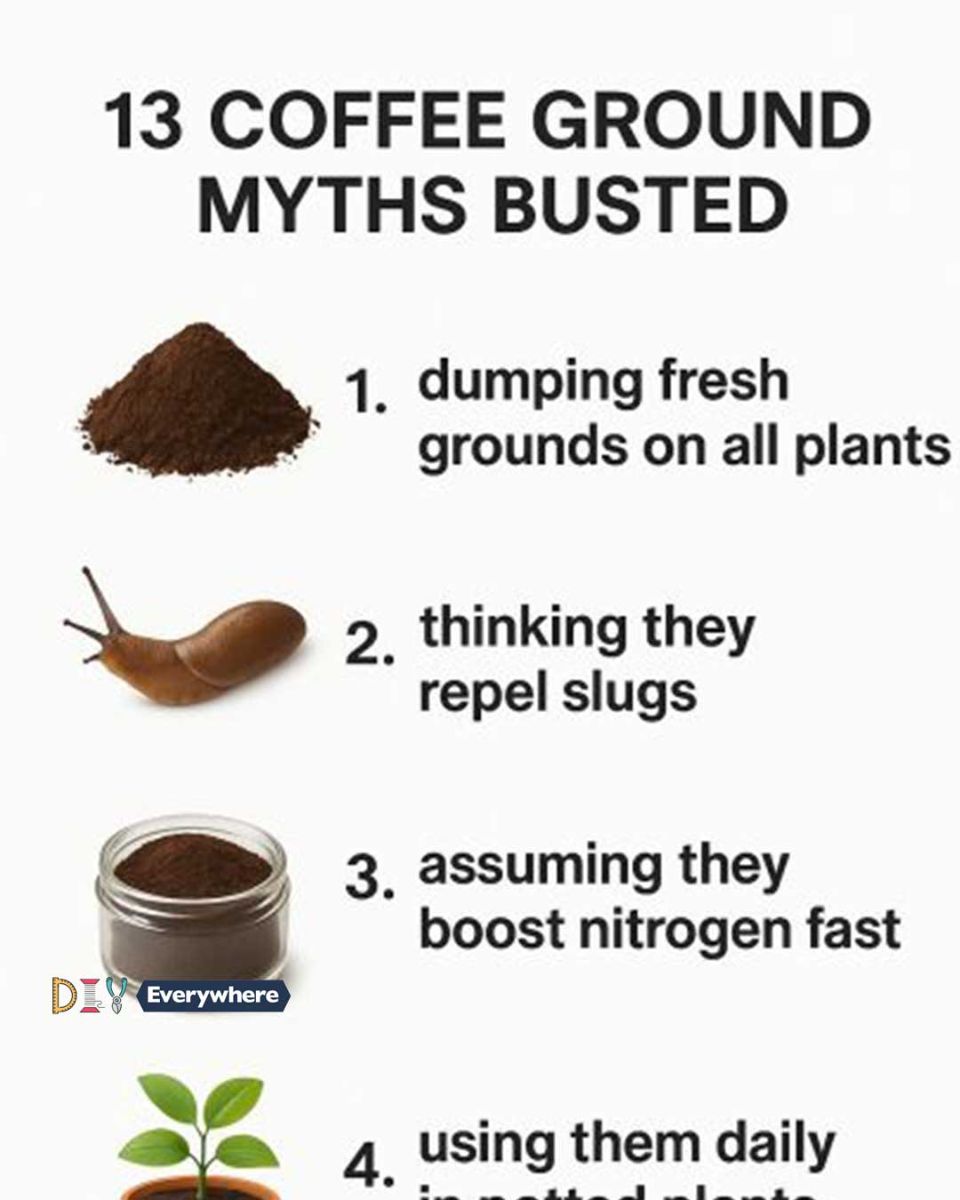Coffee grounds have become a popular subject in gardening and composting circles, often hailed as a versatile and eco-friendly addition to soil and compost heaps. With the rise of sustainable practices, many have turned to this readily available by-product of their morning brew as a miracle solution for various gardening needs. However, not all the claims surrounding coffee grounds hold true.
In this article, we delve into some common myths about coffee grounds and separate fact from fiction. While coffee grounds can be beneficial in certain contexts, misconceptions about their use can lead to unintended consequences. Here, we bust 13 myths to provide clarity and help you make informed decisions about incorporating coffee grounds into your gardening and composting practices.
Advertisement
1. Fresh Coffee Grounds Are Not Ideal for All Plants
Though coffee grounds are often touted as a universal plant booster, not all plants benefit from them. Fresh coffee grounds are highly acidic, with a pH level ranging from 4.5 to 6.0, which makes them unsuitable for plants that prefer alkaline conditions, such as lavender or some varieties of sage. Plants like blueberries, azaleas, and radishes, which thrive in acidic soil, may benefit from fresh coffee grounds, but for others, it could inhibit growth.
Moreover, the caffeine content in fresh coffee grounds can be detrimental to seedlings and young plants by inhibiting germination and growth. It’s crucial to understand the specific needs of your plants before adding fresh coffee grounds to your garden.
2. Coffee Grounds Do Not Effectively Repel Slugs
A common gardening tip suggests that coffee grounds can deter slugs, but evidence supporting this claim is sparse. Slugs may avoid crawling over dry coffee grounds due to their gritty texture, but as soon as the grounds become wet, which often happens after rain or watering, the deterrent effect diminishes significantly.
Additionally, studies have shown that the concentration of caffeine in used coffee grounds is not sufficient to repel or harm slugs. For effective slug control, gardeners may need to rely on other methods such as copper barriers or organic slug pellets.
3. Misconception About Coffee Grounds Boosting Nitrogen Quickly
Coffee grounds are often believed to be a quick source of nitrogen for plants, but this is a misconception. While coffee grounds do contain nitrogen, the nitrogen is not immediately available to plants. The decomposition process is required to break down the organic material, which can take weeks or even months, depending on environmental conditions.
For gardeners looking for a rapid nitrogen boost, other fertilizers like blood meal or fish emulsion may be more effective. Coffee grounds can contribute to long-term soil health but should not be relied upon for instant results.
4. Daily Use of Coffee Grounds in Potted Plants Can Be Harmful
Regularly adding coffee grounds to potted plants can lead to several issues. The fine particles can compact over time, leading to poor drainage and restricted airflow to the plant roots. This can create an environment conducive to mold growth, which may harm the plant.
Moreover, the acidic nature of coffee grounds can alter the soil pH over time, potentially leading to nutrient imbalances. It is advisable to use coffee grounds sparingly and to mix them with other organic matter to prevent compaction and maintain balanced soil conditions.
5. Coffee Grounds Are Not a Miracle Fertilizer
While coffee grounds contain beneficial nutrients like nitrogen, potassium, and phosphorus, they are not a complete fertilizer. These nutrients are present in small quantities and are not immediately available to plants. Relying solely on coffee grounds to fertilize your garden would not provide the balanced nutrition that plants require.
For effective fertilization, it’s important to use coffee grounds in conjunction with other organic materials and commercial fertilizers that offer a broader range of nutrients. This approach ensures that your plants receive the full spectrum of nutrients necessary for healthy growth.
6. Used Coffee Grounds Are Not Always pH Neutral
Many believe that used coffee grounds are pH neutral and safe for all plants, but this is not always the case. While brewing coffee does reduce the acidity, used grounds can still vary in pH depending on the coffee type and brewing method.
It’s important for gardeners to test the pH of their soil before adding used coffee grounds, especially for plants sensitive to pH changes. Conducting a simple soil pH test can help determine if coffee grounds are a suitable addition.
7. Coffee Grounds Do Not Completely Deter Pests
Coffee grounds are sometimes credited with deterring pests like ants, cats, and other garden invaders. However, their effectiveness is limited. Some pests may be repelled by the smell or texture, but others are unaffected.
Next Page

13 coffee ground myths busted
Pages: 1 2
